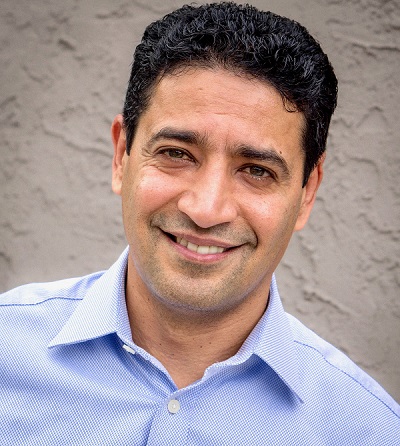Interview with TrueFort CEO Sameer Malhotra, Whose Company Raised a $30 Million Series B Round in September
When it comes to security, Sameer Malhotra and Nazario Parsacala, who cofounded TrueFort (Weehawken) in 2015, realized that applications being run by big companies were often vulnerable to attack. Not only did the applications hold critical personal information, but, equally importantly, disrupting these applications could disrupt entire companies.
Malhotra and Parsacala quickly found a market for their solution, called “TrueFort Fortress.” This “zero trust” software understands how applications should normally behave, so it can detect and contain any security risks. The company says that by “leveraging unique real-time, adaptive trust, and cloud-to-ground capabilities,” TrueFort Fortress detects and contains security threats before they become business risks.
A Background in Financial Services
The company started in the financial services realm, but quickly branched out into other sectors, since the software can help all kinds of companies. Both founders had spent more than 20 years in financial services, working in positions in infrastructure and engineering at Goldman Sacks, Bank of America and JPMorgan Chase. They held senior-level positions at these organizations; for instance, Malhotra was the CTO for infrastructure engineering at JP Morgan Chase and the Bank of America.
These organizations were always fending off cyber breaches and other attacks, Malhotra recalled. While going through the process of dealing with these attacks, “we realized that what we were trying to protect in these organizations were the applications,” he said. However, it wasn’t just a financial services issue. This problem struck companies across multiple verticals.
“And so, we decided that, if we were going to build a technology to help customers protect their critical assets, their applications, then we should build it for a broader audience. And that’s how we started.”
The Financing Journey
TrueFort raised a $3 million seed round in 2015, followed by a Series A in 2019. The most recent round, a Series B for $30 million, was led by Shasta Ventures (Menlo Park), with the participation of Canaan Partners (New York) and existing investors Evolution Equity Partners (New York), Lytical Ventures (New York) and Emerald Development Managers (New York). Strategic investor Ericsson Ventures (Santa Clara) also participated in the round. Ericsson was an early customer of TrueFort.
As part of the financing round, Nitin Chopra, managing director at Shasta Ventures, is joining TrueFort’s board of directors.
Like many entrepreneurs, Malhotra raised his financing round during a time when traveling was difficult because of COVID. “Raising money is always an interesting process, especially for young companies in the Northeast. I think, prior to COVID, if you’re in the Northeast, or you’re not in California, the expectation was that you would have to travel. But now, as things are normalized, I think the investment community is more open to investing in companies outside their ‘four blocks,’ as they say. And so, we had a fantastic experience. Shasta Ventures and Canaan Partners worked with us remotely. We never even met. We had several conversations, and then we were able to continue working with our lawyers, all remotely. It was an interesting experience, that people trusted us with fair amounts of capital, all remotely.”
How TrueFort Differs
We asked Malhotra what makes TrueFort different from all the other cybersecurity companies out there. He answered, “Many other companies in the cyber industry focus on different aspects of protecting the enterprise. Some of them protect the network, some protect the perimeter. Some of them protect the endpoints, some of them are looking at email and others are looking at other things that can cause disruption from ransomware and the like.
“We focus on protecting the applications because the applications today run the business. For example, in financial services, the payments platform where people initiate payments or receive payments, that’s run on technology. In manufacturing, all the automation that’s in use in the factory, that’s run on technology. In healthcare and in the pharmaceutical industry, the software used to do analytics and find new drugs, all that runs on technology. That capability needs to be protected. And that’s what TrueFort focuses on, irrespective of the platform on which the customer runs these applications.”
Malhotra said that the company focuses on getting the customers to understand what their applications are doing and on taking those applications to a good baseline from a security and least-privilege standpoint. After they take the applications to a baseline, the company monitors the applications in real-time, including “over 170 different parameters, looking for an abnormal behavior. And once we identify that, we can respond to that with automation in real-time, thereby protecting the customer’s application alongside identifying where the issues are.”
When the software “sees” an anomaly, what happens next “depends on the customer and how they want to interact with the platform. It can go from alerting all the way to automated response by interrupting the abnormal behavior and bringing it back to normalcy.”
How the Money Will be Spent
With the added cash from the September round, the company will invest in three main priorities, Malhotra said. “One is sales and marketing. Number two is bringing more product capabilities and partnerships to the table, including automation. And three is launching our cloud-hosted platform for the mature mid-sized company.” This will require hiring. When we spoke to TrueFort, the company had about 45 employees, and was aiming to have 90 employees by the end of the year. They are looking to eventually get their headcount up to 100 employees. And though Malhotra said they’re hiring across the country for remote roles, the company has an affinity for New Jersey, and also wants to beef up its staff here.
At the end of the interview, Malhotra had some words of encouragement for other entrepreneurs. He recalled that when he and his cofounder started out, people weren’t talking about “zero trust” or using automation to combat cyberattacks. But as entrepreneurs, they stuck by their convictions, “and today it’s paying off for us.” Entrepreneurs should know that if they stick with their ideas, it’s possible to be “an overnight success after multiple years.”



